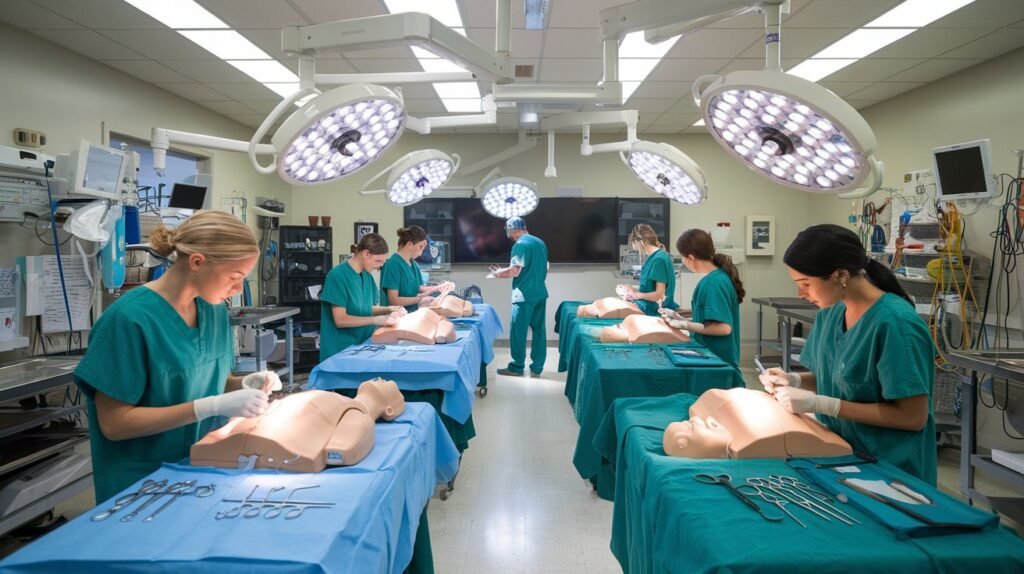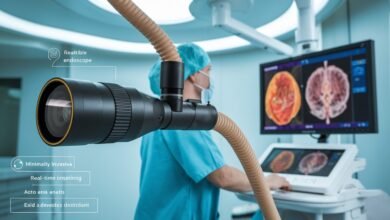
Table of Contents
ToggleHow to Choose the Perfect Surgical Tech Program for a Thriving Future:
Introductions:
A Surgical Tech Program is a specialized educational pathway designed to prepare individuals for a career as a Surgical Technologist, a key player in the operating room. These programs provide comprehensive training in the skills and knowledge necessary to assist surgeons, nurses, and other medical professionals during surgical procedures.
As the medical field continues to advance, the role of Surgical Technologists, commonly referred to as Surgical Techs, becomes increasingly crucial in ensuring the smooth operation of surgical procedures. The career of a Surgical Tech offers promising job prospects, a competitive salary, and the opportunity to play a vital role in patient care. However, the journey to becoming a successful Surgical Tech starts with choosing the right Surgical Tech Program. This comprehensive guide will help you navigate the complexities of selecting a Surgical Tech Program, ensuring you find one that aligns with your career goals and sets you up for a thriving future. Click here
Understanding the Role of a Surgical Tech:
What is a Surgical Tech Program?
A Surgical Tech Program is essentially a systematic course of study designed to equip students with theoretical and practical knowledge pertinent to creating a surgical technologist. The courses will, as a matter of course, comprise the following subject areas:
- Anatomy and Physiology: Understanding the human body and its systems is essential for performing surgeries and supporting patient care.
- Surgical Procedures and Techniques: Students learn various surgical techniques, including how to prepare and handle surgical instruments, maintain a sterile environment, and assist the surgical team.
- Microbiology: Knowledge of infection control and microorganisms to prevent post-surgical infections.
- Pharmacology: Understanding medications used in surgical settings, including their effects and potential interactions.
- Patient Care: Skills for managing pre-operative and post-operative patient care to ensure recovery and overall well-being.
Key Components of a Surgical Tech Program:
- Accreditation: Ensuring that the program meets high educational standards set by recognized accrediting bodies such as the Commission on Accreditation of Allied Health Education Programs (CAAHEP) or the Accrediting Bureau of Health Education Schools (ABHES).
- Curriculum: A well-rounded curriculum that includes both theoretical instruction and practical, hands-on training. This may involve clinical rotations in hospitals or surgical centers where students gain real-world experience.
- Certification Preparation: Many programs are designed to prepare students for certification exams such as the Certified Surgical Technologist (CST) exam, which is often required for employment.
- Program Length and Flexibility: Surgical Tech Programs vary in length and format, with options for full-time, part-time, and online or hybrid formats to accommodate different schedules and commitments.
- Cost and Financial Aid: Programs vary in cost, and many institutions offer financial aid options such as scholarships, grants, and loans to help offset tuition expenses.
- Job Placement: Effective programs often have strong connections with local hospitals and healthcare facilities, offering job placement assistance and networking opportunities to help students secure employment upon graduation.
Why Choose a Surgical Tech Program?
Choosing a Surgical Tech Program is an investment in a rewarding career with strong job prospects and opportunities for advancement. Graduates of these programs are prepared to step into a vital role in the healthcare system, contributing to successful surgical outcomes and providing essential support to medical teams.
Whether you are starting your career in healthcare or seeking to advance in the field, a well-designed Surgical Tech Program can provide the foundation needed for a successful and fulfilling career as a Surgical Technologist.
What Does a Surgical Tech Do?
A Surgical Tech plays an indispensable role in the operating room, providing critical support to the surgical team. Their responsibilities include preparing the operating room, ensuring that all necessary surgical instruments are sterilized and organized, and maintaining a sterile environment during the procedure. Surgical Techs are also responsible for passing instruments to the surgeon, assisting with patient positioning, and handling specimens.
Key tasks of a Surgical Tech include:
- Setting Up the Operating Room: Arranging surgical instruments, supplies, and equipment required for the procedure.
- Sterilization: All equipment and the operating field should be treated as sterile in order to prevent infections.
- Assisting During Surgery: Passing instruments to the surgeon, suctioning blood, and maintaining the sterile field.
- Post-Operative Duties: Cleaning and restocking the operating room, and assisting with patient recovery.
Key Responsibilities and Skills Required:
To excel as a Surgical Tech, you must possess certain skills and attributes, including:
- Attention to Detail: Precision is crucial in the operating room, and Surgical Techs must meticulously handle instruments and maintain sterility.
- Manual Dexterity: Excellent hand-eye coordination and fine motor skills are necessary for handling delicate surgical instruments.
- Calm Under Pressure: The ability to remain composed and focused during high-stress situations is essential.
- Strong Communication Skills: Effective communication with surgeons, nurses, and other team members ensures a smooth surgical process.
- Knowledge of Sterile Techniques: Understanding and applying sterile techniques to avoid infections is a fundamental requirement.
Why Surgical Tech Is a Rewarding and In-Demand Career:
A Surgical Tech career is very rewarding as well as in full demand. The reasons include:
- Job Security: The growing number of surgeries and advancements in medical technology lead to a strong demand for skilled Surgical Techs.
- Competitive Salaries: Surgical Techs earn attractive salaries, which can vary based on experience, location, and specialization.
- Career Growth: Opportunities for career advancement, such as specializing in specific types of surgery or taking on supervisory roles, are available.
- Fulfillment: The role offers a sense of accomplishment by contributing to successful surgical outcomes and patient care.
What to look for when deciding on a Surgical Tech Program:
1. Accreditation
Importance of Choosing an Accredited Program:
Accreditation is a crucial factor in selecting a Surgical Tech Program. An accredited program meets specific educational standards and provides quality training. Accreditation also affects your eligibility for certification exams and employment prospects.
How Accreditation Impacts Certification and Job Prospects:
Programs accredited by recognized bodies, such as the Commission on Accreditation of Allied Health Education Programs (CAAHEP) or the Accrediting Bureau of Health Education Schools (ABHES), ensure that you receive a quality education. Accreditation is essential for taking certification exams and enhances your employability by signaling to employers that you have received a comprehensive education.
Examples of Reputable Accrediting Bodies:
- CAAHEP: The Commission on Accreditation of Allied Health Education Programs is one of the highly recognized accreditors that ensure programs meet high standards in education.
- ABHES: The Accrediting Bureau of Health Education Schools accredits healthcare programs, including those in surgical technology, ensuring they adhere to industry standards.
2. Program Curriculum:
Core Subjects and Skills Covered in a Good Program:
A well-rounded Surgical Tech Program curriculum should cover essential subjects and skills, including:
- Anatomy and Physiology: A thorough understanding of the human body and its systems is crucial for performing surgeries.
- Surgical Procedures: Training in various surgical techniques, including instrument handling, sterile techniques, and patient positioning.
- Microbiology: Knowledge of microorganisms and infection control practices to prevent post-surgical infections.
- Pharmacology: Understanding medications used in the surgical environment, including their effects and potential interactions.
- Patient Care: Skills in pre-operative and post-operative care, including patient monitoring and recovery.
Hands-On Clinical Experience and Labs:
Practical experience is vital in developing the skills necessary for a career in surgical technology. Look for programs that offer extensive hands-on clinical rotations and lab work. These experiences provide students with real-world applications of their theoretical knowledge and help them gain confidence in their abilities.
Importance of Modern Facilities and Up-to-Date Equipment:
Training with modern technology and equipment ensures that students are familiar with the tools they will encounter in their careers. Programs that invest in up-to-date facilities and equipment offer a more relevant education, better preparing students for the job market.
3. Program Length and Flexibility:
Full-Time vs. Part-Time Options:
Surgical Tech Programs can vary in length and format. Full-time programs typically take 1-2 years to complete, while part-time options may extend over a longer period. Consider your personal schedule and choose a program that fits your needs.
Typical Program Durations (Certificate, Diploma, Associate Degree):
Programs are available in different formats:
- Certificate Programs: Shorter programs focused on core skills and knowledge, ideal for those seeking to enter the field quickly.
- Diploma Programs: Offer a more in-depth education than certificate programs, covering additional topics and providing more clinical experience.
- Associate Degrees: Comprehensive programs that include general education courses alongside specialized surgical technology training, providing a broader educational foundation.
Balancing Education with Work or Family Commitments:
If you have work or family responsibilities, look for programs offering flexible scheduling options. Some institutions offer evening or weekend classes, online courses, or hybrid formats combining online learning with in-person clinical training. This flexibility allows you to manage your education while fulfilling other commitments.
4. Cost and Financial Aid:
Average Tuition Costs for Surgical Tech Programs:
The cost of Surgical Tech Programs can vary widely based on location, program length, and institution. The tuition price depends on the school, ranging from $5,000 to $30,000. It’s important to research and compare costs to find a program that fits your budget.
Availability of Scholarships, Grants, and Financial Aid:
Explore financial aid options to support your education. Scholarships, grants, and loans could finance the tuition costs you need to pay. Many programs offer their own scholarships or have partnerships with organizations providing funding for healthcare students. You may be awarded federal and state financial aid programs.
Return on Investment: Potential Salary and Job Opportunities Post-Graduation:
Consider the potential return on investment by evaluating the average salary and job outlook for Surgical Techs. Research local job markets and compare salary expectations with program costs to ensure your investment aligns with your career goals. A thorough analysis will help you determine whether the financial commitment is justified by the expected career benefits.
5. Certification Preparation
Does the Program Prepare Students for the CST (Certified Surgical Technologist) Exam?
One of the primary objectives of a Surgical Tech Program is to prepare students for the CST (Certified Surgical Technologist) exam. Ensure that the program offers comprehensive preparation for this certification, as it is often required for employment. Certification validates your skills and knowledge in surgical technology and enhances your job prospects.
Importance of Passing the Certification Exam for Job Prospects:
Certification is a key factor in securing a job as a Surgical Tech. Many employers require or prefer certification, so passing the CST exam is crucial for employment. Certification will assure them of your competency and professionalism; therefore, you are a competent candidate for prospective employers.
6. Job Placement Rates:
How to Research a Program’s Job Placement Rate:
Investigate the job placement rate of the programs you are considering. A high placement rate indicates that the program effectively prepares students for the job market and has strong connections with employers. Contact the program’s career services office to obtain information about their placement statistics and job search support.
Importance of Strong Connections with Local Hospitals and Healthcare Facilities:
Programs with established relationships with local hospitals and healthcare facilities provide valuable networking opportunities and increase your chances of finding employment after graduation. Strong connections with healthcare providers often lead to more internship and job placement opportunities, helping you start your career with a solid foundation.
7. Reputation and Reviews:
How to Find and Evaluate Program Reviews (From Graduates and Employers):
Research reviews and testimonials from current students and alumni to gain insight into the program’s quality. It looks for feedback about the curriculum, faculty, and experiences in general by students. Online forums, social media groups, and online review websites are also good sources of honest opinions. Additionally, speaking with employers who have hired graduates from the program can provide further insights into the program’s reputation.
Importance of the Program’s Reputation in the Medical Community:
A program’s reputation in the medical community can impact your job prospects. Programs with a strong reputation are more likely to be recognized and valued by employers, enhancing your career opportunities. Consider the program’s reputation when making your decision, as it can influence your future success in the field.
Additional Tips for Choosing the Best Program:
Visit Campuses or Take Virtual Tours:
If you can manage it, go to the campuses that you are considering visit. This allows you to see the facilities firsthand, meet with faculty, and get a sense of the program’s environment. If an in-person visit isn’t feasible, take advantage of virtual tours offered by many institutions to explore the program’s resources and offerings. This firsthand experience can help you assess whether the program meets your needs and expectations.
Talk to Current Students or Alumni:
Reach out to currently enrolled students or graduates for firsthand feedback on the program. Their experiences will really give you insight into which aspects of the program are good and which have room for improvement. Ask about their experiences with the curriculum, clinical training, and job placement. Their feedback can help you make a more informed decision and give you a clearer picture of what to expect.
Attend Information Sessions or Open Houses:
Participate in information sessions or open houses hosted by the program. These events offer an opportunity to learn more about the program, meet instructors, and ask questions about the curriculum, clinical experiences, and career support. Attending these events can help you gather important information and make a well-informed choice.
Conclusion:
Choosing the right Surgical Tech Program is a critical step toward a successful and fulfilling career as a Surgical Technologist. By carefully considering factors such as accreditation, curriculum, program length, cost, certification preparation, job placement rates, and reputation, you can make an informed decision that aligns with your career objectives, getting you on track for a bright future.
Take the time and energy to properly research and make comparisons among your choices. The right program will provide you with the necessary skills and knowledge, opening doors to a rewarding and impactful career in the field of surgical technology. As you embark on this important journey, remember that your choice of program will have a significant impact on your career success and overall satisfaction in the field.
FAQs:
What Is the Best Certification for a Surgical Tech?
The CST (Certified Surgical Technologist) certification is widely recognized and often required for employment. It validates your skills and knowledge in surgical technology and enhances your job prospects. Additionally, some states may have their own certification or licensing requirements, so be sure to check local regulations to ensure you meet all necessary qualifications.
What is the Time Period Needed to Obtain Certification as a Surgical Technologist?
The time required to become a certified Surgical Technologist depends on the program you choose. Certificate programs typically take about 1 year to complete, while associate degree programs may take 2 years. The test must be taken and passed after completing the CST program. The overall timeline includes both the educational component and the certification process.
Is the Demand for Surgical Techs Increasing?
Yes, the trend is an increase in the demand for Surgical Techs. It goes hand in hand with the increasing number of surgeries and continuous advancements in medical technology. The trend indicates a very promising job opportunities perspective and career growth. Bureau of Labor Statistics points out that there will be faster employment increases than the average for all occupations concerning the occupation of a Surgical Tech, indicating continued demand for skilled laborers in the field.









